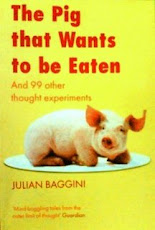The God introduced to us in this chapter is a very tough God. He sounds very early Biblical, circa Moses' time, or one of those that lived on Mount Olympus. They seemed to be able to command mankind at whim and fancy, usually at the threat of untold misery in the form of miraculous catastrophes.
As cavemen developed into mankind in societies, we needed explanations for many natural occurrences around them. LIghtning and thunder became manifestations of anger of the higher powers, so were disease, famine and war. Blessings from the gods came in the form of good weather, bountiful harvests and accidental discoveries of gold. It was easy to attribute these occurrences to religion. A society where followers of a dominant religion were prosperous and powerful were often described as blessed by the Gods and thus had the right to impose themselves on others.
Anyway, what I am trying to get at is, early man needed God to explain things he could not fathom. It was easy to do so. Animism, and some religions like Hinduism and Catholicism, and many superstitions factor highly on the 'work of higher powers' scale to validate certain practices. We were asked in junior college, "Did Man create God or did God create Man?". That really got us thinking.
The science came along. Since some bloke said the Earth went around the Sun and got in trouble with the Church, there has been no let up in the revisions organised religion has had to do to keep 'up-to-date' with popular belief and the rationality we in the 21st century have come to subscribe to. I recently read a book Why the Toast Always Lands Butter-Side Down: The Science of Murphy's Law by Richard Robinson which explained many phenomena we had come to accept as bad luck or Murphy's Law - even why bad things happen in threes.
Yes, by definition we cannot square a circle. That amount of logic requires us to be rational about it. Being rational about things we have to deal with helps us get through life. Being irrational will probably make one lose friends. But being rational and logical about everything will turn most of us into atheists bent on applying science and reason. It might be interesting to find out how many physicists are religious.
So we need reason to live our lives, but faith to believe in and not get too far ahead of ourselves. I bet there are some people who can compartmentalise their logic and faith bits, and turn them on and off at the right time. It helps them get by. If you take religion as a way to basic ethics and to differentiate good and bad, and perhaps to build communities, the pain of questioning God in light of science and reason goes away.
Sunday, January 4, 2009
Subscribe to:
Post Comments (Atom)
.jpg)
1 comment:
Hi Gurmit
Your blog looks interesting! I would just like to comment on this chapter of TPTWTBE.
The author assumes that, like us, our God is bounded by our limited understanding of the way things work. I wonder if the author realised how much science has evolved since the time of Galileo, then Newton, then Einstein, and now contemporary physics. We used to think of time as being an absolute phenomenon, and we used to think that matter is infinitely divisible. We even used to think that light has no weight, or that energy and mass are seperate, independent concepts. But modern science has disproven every single one of these notions. Who can now say that shapes will take an absolute form from all frames of reference? Will a square remain a square if we are travelling at distances close to the speed of light?
And our God transcends the physical boundaries of this universe we live in. It is simply unimaginable how many more things we thought impossible had been very possible all along
Thanks for listening!
Post a Comment